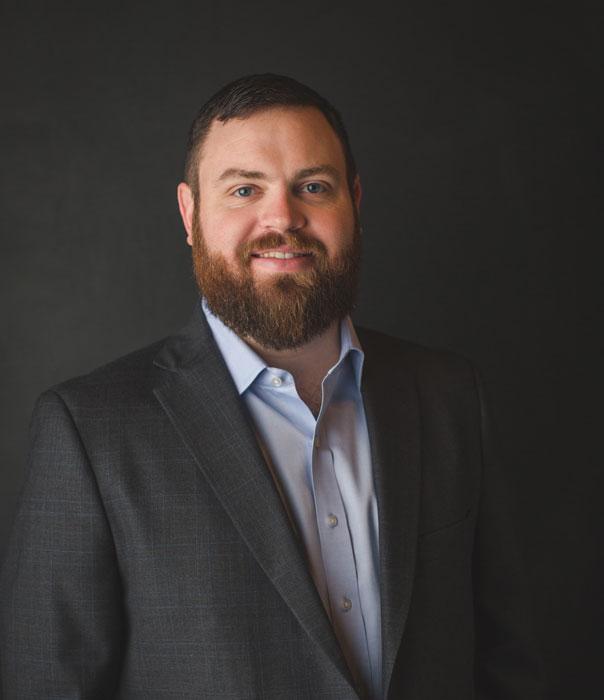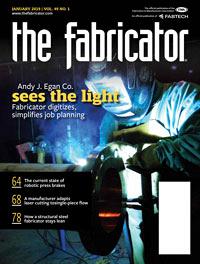Senior Editor
- FMA
- The Fabricator
- FABTECH
- Canadian Metalworking
Categories
- Additive Manufacturing
- Aluminum Welding
- Arc Welding
- Assembly and Joining
- Automation and Robotics
- Bending and Forming
- Consumables
- Cutting and Weld Prep
- Electric Vehicles
- En Español
- Finishing
- Hydroforming
- Laser Cutting
- Laser Welding
- Machining
- Manufacturing Software
- Materials Handling
- Metals/Materials
- Oxyfuel Cutting
- Plasma Cutting
- Power Tools
- Punching and Other Holemaking
- Roll Forming
- Safety
- Sawing
- Shearing
- Shop Management
- Testing and Measuring
- Tube and Pipe Fabrication
- Tube and Pipe Production
- Waterjet Cutting
Industry Directory
Webcasts
Podcasts
FAB 40
Advertise
Subscribe
Account Login
Search
What makes a good leader in metal fabrication?
Those who help others be as productive as they are
- By Tim Heston
- January 19, 2019
- Article
- Shop Management
A welder fresh out of school arrives at his first job. He’s eager to learn more, and the company even provides additional training. Life’s looking good. But a few months into the job the welder notices something: The welder next to him really isn’t that productive. He just seems to be mailing it in, clocking in and out, counting the years until he can retire.
The young welder really doesn’t know where to turn. He’s a rookie, an eager one, but a rookie all the same. It doesn’t seem fair. His older colleague is probably paid more, thanks to his years of experience, but he’s just not very productive. All too often the rookie welder lifts his helmet and glances over to see an empty welding booth. The veteran welder seems to be doing just enough to keep his job, but that’s about it. Frustrated, the young welder moves on to another employer.
This story has plenty of variants. The just-mail-it-in co-worker needn’t be older. It could be someone of any age, in any metal fabrication profession, or in any profession period. And the problem may not be about work ethic; the co-worker may be unhelpful, resistant to any change, or just plain difficult. Regardless, the common theme is that poor workplace behavior—be it a poor work ethic or anything else—goes unnoticed, lost in a big bureaucracy focused on production targets and data, not people. So life goes on, and instead of being an engaging meritocracy, the workplace is awash with mediocrity and apathy.
Jacob Wilson, the president and CEO of Morrison Industries, has done just about everything to avoid this. He took over the Lebanon, Tenn.-based metal fabricator after his father retired in late 2010, when he was just 23 years old. He grew up around the family business, and as a high schooler worked his way through various positions on the floor. He graduated college in 2009 and didn’t plan to join the family business. But, of course, the Great Recession was in full swing. “There weren’t many opportunities, and my dad needed help. And with that time at college, spent away from the shop, I realized how much potential there was for a company like this.” When was he offered the reigns? “Well, I was 23. I had no fear.”
Wilson chuckled. “My dad says now that he knew if I had waited longer [to take over the company], I would have realized how much I didn’t know.”
All the same, he did have a few good instincts. The company’s plant in Morrison (not far from the corporate offices in Lebanon) is near several large manufacturing plants, all of which are competing for good people. Morrison has 300 employees, including more than 150 welders, so it’s no small shop as far as fabricators go. But compared to the factories nearby, some of which employ several thousand, Morrison Industries is a small operation. As such, it lacks a deep bureaucracy and corporate hierarchy—which on its own makes it attractive for many.
Besides this, what can the fabricator offer that local companies can’t? Consider orientation day. On their first day, new hires walk into the plant and meet the HR staff and, minutes later, Wilson himself. As CEO, Wilson spends the next two or three hours with them. He conveys the standard orientation information—how the company was founded (as a tool and die shop) and how it has evolved into a flexible metal fabricator of (among other things) returnable containers for the automotive supply chain. He talks about how demanding this work can be, and how important these returnable containers are.
But then he delves a little deeper than your typical orientation talk. He outlines the company’s presence within and outside the automotive supply chain and describes the road map—“our hopes and dreams,” he said, adding that he wants to be sure new hires know the company’s direction and goals.
What will make those hopes and dreams a reality? “That’s when I talk about the company’s values and behaviors,” Wilson said.
During our hourlong conversation, that was the only time I heard Wilson say “values.” For the most part, he stayed with more tangible terms, especially “behaviors.” This includes showing up on time, of course, but most critically, it also includes helping everyone be as productive as possible.
“We’re not looking for someone with a Rambo mentality, people who believe they can do everything on their own, make the fastest welds, or whatever it is,” Wilson said. “We want people who take their experiences and talents and share them with others. When hearing this, sometimes people ask me, ‘So, you’re telling me that if I make these guys around me work as fast as me, I can make more money?’ And I say, ‘Absolutely you can. That’s called being a leader.’”
That statement may be at least one small part of Morrison’s success in recent years. Leaders don’t just push others to work harder; they work harder themselves. It’s less corporate and bureaucratic, more familial.
In 2011 Morrison had $15 million in annual revenue; today it’s a $25 million-plus company, and about half of its workers happen to be younger than 30.
Having such a young workforce wasn’t intentional. It’s just how the demographics worked out. With such low local unemployment, available workers tend to be young.
“Sometimes it’s that 23-, 24-, or 25-year-old who has young kids, and perhaps manufacturing wasn’t his first choice,” Wilson said. “But it’s fulfilling for me and my team to see those people grow and change. We’re really a fast-moving meritocracy where people who have good thoughts and ideas, and do the right thing, find a lot of opportunity.”
Morrison Industries, www.morrisonindustries.com
About the Author

Tim Heston
2135 Point Blvd
Elgin, IL 60123
815-381-1314
Tim Heston, The Fabricator's senior editor, has covered the metal fabrication industry since 1998, starting his career at the American Welding Society's Welding Journal. Since then he has covered the full range of metal fabrication processes, from stamping, bending, and cutting to grinding and polishing. He joined The Fabricator's staff in October 2007.
subscribe now

The Fabricator is North America's leading magazine for the metal forming and fabricating industry. The magazine delivers the news, technical articles, and case histories that enable fabricators to do their jobs more efficiently. The Fabricator has served the industry since 1970.
start your free subscription- Stay connected from anywhere

Easily access valuable industry resources now with full access to the digital edition of The Fabricator.

Easily access valuable industry resources now with full access to the digital edition of The Welder.

Easily access valuable industry resources now with full access to the digital edition of The Tube and Pipe Journal.
- Podcasting
- Podcast:
- The Fabricator Podcast
- Published:
- 04/16/2024
- Running Time:
- 63:29
In this episode of The Fabricator Podcast, Caleb Chamberlain, co-founder and CEO of OSH Cut, discusses his company’s...
- Trending Articles
Steel industry reacts to Nucor’s new weekly published HRC price

How to set a press brake backgauge manually

Capturing, recording equipment inspection data for FMEA

Are two heads better than one in fiber laser cutting?

Hypertherm Associates implements Rapyuta Robotics AMRs in warehouse

- Industry Events
16th Annual Safety Conference
- April 30 - May 1, 2024
- Elgin,
Pipe and Tube Conference
- May 21 - 22, 2024
- Omaha, NE
World-Class Roll Forming Workshop
- June 5 - 6, 2024
- Louisville, KY
Advanced Laser Application Workshop
- June 25 - 27, 2024
- Novi, MI



























